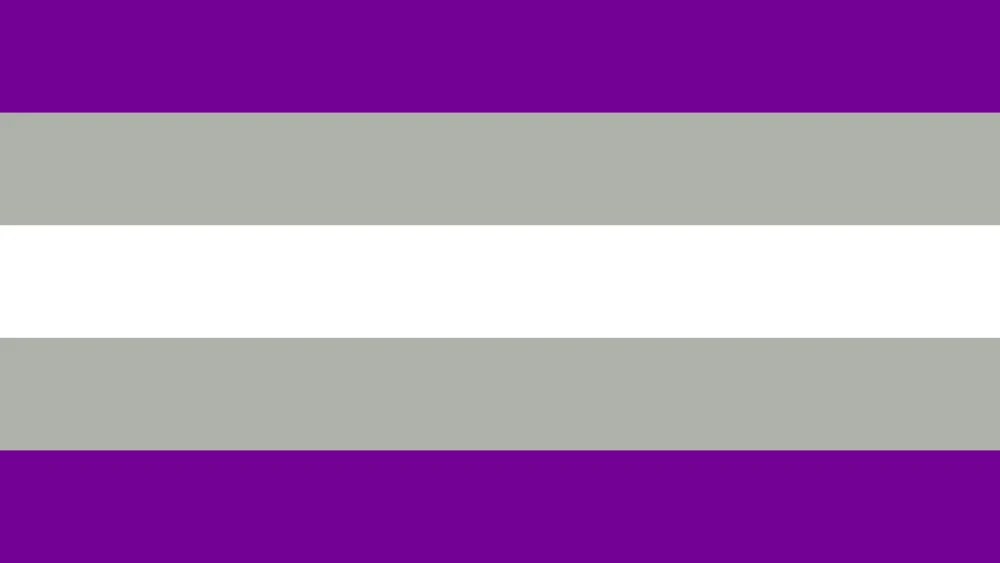Greysexual – What is it? What does it mean?
 Greysexual flag
Greysexual flag
Terminology
The term stems from the idea that sexuality is not black and white. Rather it focuses on the idea of a spectrum with having a gray area between asexuality and allosexuality. People who identify as greysexual most of the time are a part of the ace community.
Asexuality Visibility and Education Network says that an asexual person experiences little to no sexual attraction. The opposite of asexual is sexual which can also be referred to as allosexual. Graysexual folks fall somewhere in between asexual and allosexual. Essentially a graysexual person feeling sexual attraction rarely is somewhere around the midpoint between allosexual and asexual.
According to the Identiversity glossary of terms graysexual is an adjective that describes:
“someone who rarely experiences sexual attraction”
There are also terms that are synonymous like gray-asexuality or grey-asexuality, gray-A or grey-A, grey-ace or gray-ace. Having a gray-A orientation or sexual identity means experiencing sexual attraction infrequently or not feeling sexual attraction in the way allosexual people do in romantic relationships.
For gray ace people, their sexual identity is characterized by experiencing a limited sexual attraction. According to a clinical sexologist and sexuality expert Sarah Melancon:
“People who call themselves graysexual tend to feel sexual attraction rarely, at a low level of intensity, and/or only in very specific situations,”
Even though many graysexual people consider themselves a part of asexual community, but every person is different. Some may prefer to stick to the terminology and only identify themselves as gray-A.
Despite the common misconception that sexuality and libido are the same thing, some folks still find the need to provide medical advice to graysexual individuals. People who may be experiencing sexual attraction but not prioritizing sexual attraction over other factors in a relationship may identify with the term greysexual. It is important to note that being a graysexual person does not constitute having a low sex drive. Sexual attraction and libido are not necessarily linked. This does not mean that greysexuality is among health conditions that people with low libido face.
A sexual attraction which is a primary attraction typically refers to finding a person attractive and wanting to have sex with them. Asexual and graysexual people may be romantically attracted to their partners. Some may even experience secondary attraction towards someone. Also, some graysexual people may enjoy sex and feel the need for it without being sexually attracted to a person.
History
The early 2000s
Greysexuality found its place among other sexual orientations somewhere in the early 2000s. In 2003 a member of the Asexuality Visibility and Education Network or AVEN forum suggested the term semisexuality to refer to the people experiencing sexual attraction in specific circumstances.
In 2006 another member of the AVEN forum suggested the term asexuality gray or gray-A to refer to the gray area on the spectrum.
Mid 2000s
The term gained attention in 2015. In an article for Mic magazine, sexuality educator Sari Locker stated that greysexual individuals “feel they are within the gray area between asexuality and more typical sexual interest.”
Many greysexual people experiencing sexual attraction infrequently began identifying as a grey ace. In an asexual census of that same year, 15.6% of respondents identified as greysexual.
Present Day
Greysexual is now a prominent term to describe sexual orientation that is on the asexual spectrum but does not quite fit into the terminology. Many greysexual people post frequently on online forums about their sexuality. It is one of the most recognized sexual orientations on the asexuality spectrum. Greysexuality also refers to sexual and romantic identities.
Differences
Greysexual vs Demisexual
Demisexual people experience sexual attraction after a deep emotional connection. This means a demisexual experience is different from greysexual experience because they need a strong emotional connection in order to feel aroused. A demisexual person who has a close emotional bond with their partner may end up experiencing attraction that is intense and frequent.
A grey ace person will only feel infrequent or low-intensity sexual attraction. Demisexual folks may be able to experience sexual attraction whereas asexual and graysexual people may not. A key thing to remember is that asexual and graysexual people may also be demisexual since sexualities are fluid.
Greysexual vs Asexual
Asexual people do not experience sexual attraction. This means that an asexual person will not experience feelings of sexual attraction whereas a greysexual person may experience sexual attraction at some point in their life. Sexuality and orientation are quite fluid. Some people fall on the asexual side of the spectrum more than the greysexual side, but a person may find the capacity for sexual attraction over time.
Greysexual vs Allosexual
Allosexual people experience sexual attraction frequently and with high intensity. This means that an allosexual person will have strong feelings of sexual attraction to people they have sex with. A greysexual person may experience sexual attraction once or twice during their lifetime and not necessarily towards someone they have sex with. It is possible for an allosexual person to eventually identify as greysexual.
Romantic Attraction
Sexual attraction and romantic attraction are two different concepts. Greysexual people may or may not experience romantic attraction. Graysexual people may have romantic orientations that are on the aromantic spectrum which means they do not experience romantic attraction but may experience sexual attraction to people.
Others say their romantic orientation is greyromantic which means they experience infrequent romantic attraction. There are also demiromantic greysexual folks as well as heteroromantic meaning they are romantically attracted to different gender and homoromantic greysexual people who are romantically attracted to the same gender. So, asexual and graysexual people may have a variety of romantic orientations during their life span.
Graysexual people can and often do experience different forms of attraction. They may include:
- Romantic: attraction based on a desire to have a romantic relationship
- Aesthetic: attraction based on looks
- Sensual: attraction based on the desire to touch, hold or cuddle
- Platonic: attraction based on friendship
- Emotional: attraction based on an emotional connection
So, a greysexual person may experience not only a romantic attraction, but also aesthetic, platonic, or emotional attraction without desiring to have sex with the object of their attraction.
Pronouns
It is important to note that some graysexual people may consider greysexuality their primary identity or sexual orientation. That said, many greysexual people also identify as queer, non-binary, transgender, cisgender, genderqueer, and so on. Graysexual people may use a variety of pronouns including gender specific ones like he/him or she/her as well as gender-neutral pronouns like they/them.
Always use inclusive language when addressing someone. It is important never to assume someone’s gender identity based on their gender expression or sexual orientation. Share your pronouns first and politely ask the greysexual person about the pronouns they prefer using in conversation. Some people may not use pronouns at all and ask to use their name instead.
Flag and Symbols
Flag
The flag representing greysexual orientation was designed in 2013. Its colors are purple, grey, and white which are similar to the asexual flag.
- Purple stands for asexuality
- Grey for infrequent attraction
- White for allosexuality
 Greysexual flag
Greysexual flag
An alternate version of the greysexual flag appeared in December 2020. The flag features darker shades to represent occasional sexual attraction, mid-way shades to represent the ace spectrum, light shades for the feelings of no sexual attraction, and white represents a community.
 Alternate greysexual flag
Alternate greysexual flag
Another version of the greysexual flag featuring grey, dark and light purple as well as white color stripes appeared in the LGBTA+ Wiki discord.
 Alternate greysexual flag
Alternate greysexual flag
A Reddit user created an alternate version featuring a darker color scheme in April 2021. The five-striped flag features black, dark grey, purple, light grey as well as white.
- Black black represents no sexual attraction
- Dark grey represents very little sexual attraction
- Purple represents conditional sexual attraction
- Light grey represents some sexual attraction
- White stands for community
 Potential alternate greysexual flag by Reddit user
Potential alternate greysexual flag by Reddit user
Symbol
The symbol for the greysexual orientation features a circle with a line in it. It is similar to the asexual symbol which is a circle but has a line that stands for infrequent sexual attraction.
 Greysexual symbol
Greysexual symbol
How to Know if You are Greysexual?
If you are thinking about your sexual orientation and feel that greysexual may be the best term to describe it then go for it. There truly is no quiz available to confirm your greysexuality. You are the only person that can decide whether the terminology fits you best.
If you think about a few things that are common for greysexual people, you may be able to find the answers you are looking for. Ask yourself a few questions in order to determine whether your sexuality fits under the greysexuality umbrella.
- Do you seldom experience sexual attraction?
- How intense are your feelings?
- Do you feel the need to be sexually attracted to a person before the relationship?
- Do you think sex matters in a relationship?
- Are there other ways to show affection that you find more appropriate than sex?
There really is no right or wrong answer here. These questions may help you identify yourself as a greysexual individual. Understanding your feelings and putting a label on your identity may help you lead a healthier and happier life.
Remember, greysexuality is different for every person. To some people, it may be more about the fact that they experience infrequent sexual attraction, to others it will be more about the low intensity of the feeling.
You may be greysexual if you:
- Experience infrequent sexual attraction
- Feel very weak sexual attraction
- Feel sexually attracted to people only in specific circumstances
- Experience attraction that is somewhat sexual
- Have no desire in a sexual relationship
Being greysexual does not limit you in any way in terms of attraction and even sex. Greysexual people can also be pansexual, bisexual, gay, lesbian, and so on.
If you do not prioritize sexual attraction in your choice of a romantic partner. If you feel that sex is not an important part of a relationship then greysexual may be the best label for your sexual orientation.
Relationships and Greysexuality
People who identify as greysexual are not necessarily single for their whole lives. They may form meaningful partnerships with other greysexual people, asexual people, and allosexual people. These relationships can be long-term and long-lasting. Greysexual people may form families and get married if they choose to. They may also choose to remain single, and that is absolutely okay.
Greysexual individuals may desire romantic relationships, but sex is not a priority for them in a committed partnership with someone. This may be different for everyone. Sex may be an important factor for some greysexual people in relationships. Some people enjoy sex without being intensely attracted to the person.
Remember that being greysexual is not about the actual enjoyment of sexual intercourse it is about sexual attraction to another person. People have sex for many different reasons. Some of these reasons may be:
- For intimacy
- For emotional bonding
- For pleasure and fun
- For procreation
Some greysexual people just like allosexual people may be sexually attracted to others but never have sex with them, while others may not be attracted yet have a sexual relationship with the person.
Greysexual people may also experience a feeling of repulsion and aversion when it comes to sex. They may use words like sex-repulsed, sex-neutral, sex-positive to describe their feelings towards sexual activities.
Greysexuals may not only enjoy sex but also like masturbation, but it is a unique experience and may differ from person to person.
Supporting Greysexual People
You can start by educating yourself as well as others about greysexuality. The best ways to do so are probably joining a local LGBTQA+ community organization, reading more online, creating message boards and asking questions about greysexuality, connecting with greysexual people.
You can also learn more from the Asexual Visibility and Education Network or AVEN. It has a great list of resources, glossaries, support materials, and so much more.
You can show your support by doing some of the following:
- Raising awareness of greysexuality at school or workplace
- Talking about sex, sexuality, and subjects relating to gender identity, expression, and sexual orientation
- Waving the greysexual flag and showing off the symbol during pride events
- Discussing greysexual issues online and social media
- Speaking out against harassment or bullying of greysexual individuals.
Gallery
An alternative version of the greysexual flag:
 Alternative version of the greysexual flag
Alternative version of the greysexual flag
Another version of the greysexual flag:
 Another grey-ace alternative flag
Another grey-ace alternative flag
An alternative version of the greysexual flag is available online:
 Alternate version of greysexual flag
Alternate version of greysexual flag
